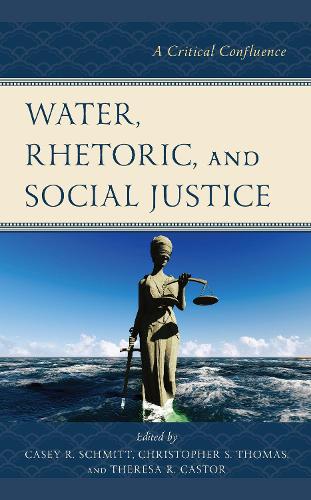
Water, Rhetoric, and Social Justice: A Critical Confluence
(Hardback)
Available Formats
Publishing Details
Water, Rhetoric, and Social Justice: A Critical Confluence
By (Author) Casey R. Schmitt
Edited by Christopher S. Thomas
Edited by Theresa R. Castor
Contributions by Mostafa Aniss
Contributions by Joshua Trey Barnett
Contributions by Elizabeth Brunner
Contributions by Catherine J. Bruns
Contributions by Theresa R. Castor
Contributions by Jordan Christiansen
Contributions by Emilie Falc
Bloomsbury Publishing PLC
Lexington Books
20th January 2020
United States
Classifications
Professional and Scholarly
Non Fiction
Communication studies
Environmental science, engineering and technology
363.61
Physical Properties
Hardback
378
Width 161mm, Height 227mm, Spine 25mm
680g
Description
Water, Rhetoric, and Social Justice: A Critical Confluence examines how individuals and communities have responded on a global scale to present day water crises as matters of social justice, through oratory, mass demonstration, deliberation, testimony, and other rhetorical appeals. This book applies critical communication methods and perspectives to interrogate the pressing yet mind-boggling dilemma currently faced in environmental studies and policy: that clean water, the very stuff of life, which flows freely from the tap in affluent areas, is also denied to huge populations, materially and fluidly exemplifying the currents of justice, liberty, and equity. Contributors highlight discourse and water justice movements in nonofficial spheres from activists, artists, and the grassroots. In extending the technical, economic, moral, and political conversations on water justice, this collection applies special focus on the novel rhetorical concepts and responses not necessarily unique to but especially enacted in water justice situations. Scholars of rhetoric, sociology, activism, communication, and environmental studies will find this book particularly useful.
Reviews
Water, Rhetoric, and Social Justice: A Critical Confluence is a timely anthology that takes on an issue of great importance for the more-than-human world: water justice. The relationships between water, rhetoric, and social justice in the Anthropocene must be understood, analyzed, challenged, and reimagined if we are to have any chance of intervening on systems of colonialism, privatization, inequity, poverty, and racism that have shifted our understanding of water from universal right to an earned privilege. The chapters in this volume illuminate the many ongoing struggles over water injustices and highlight the important role that rhetoric has to play in promoting water justice.--Danielle Endres, University of Utah
Author Bio
Casey R. Schmitt is assistant professor of communication studies at Gonzaga University. Theresa R. Castor is professor and department chair of communication at the University of Wisconsin-Parkside. Christopher S. Thomas is assistant professor in the Department of Communication at the College at Brockport.
